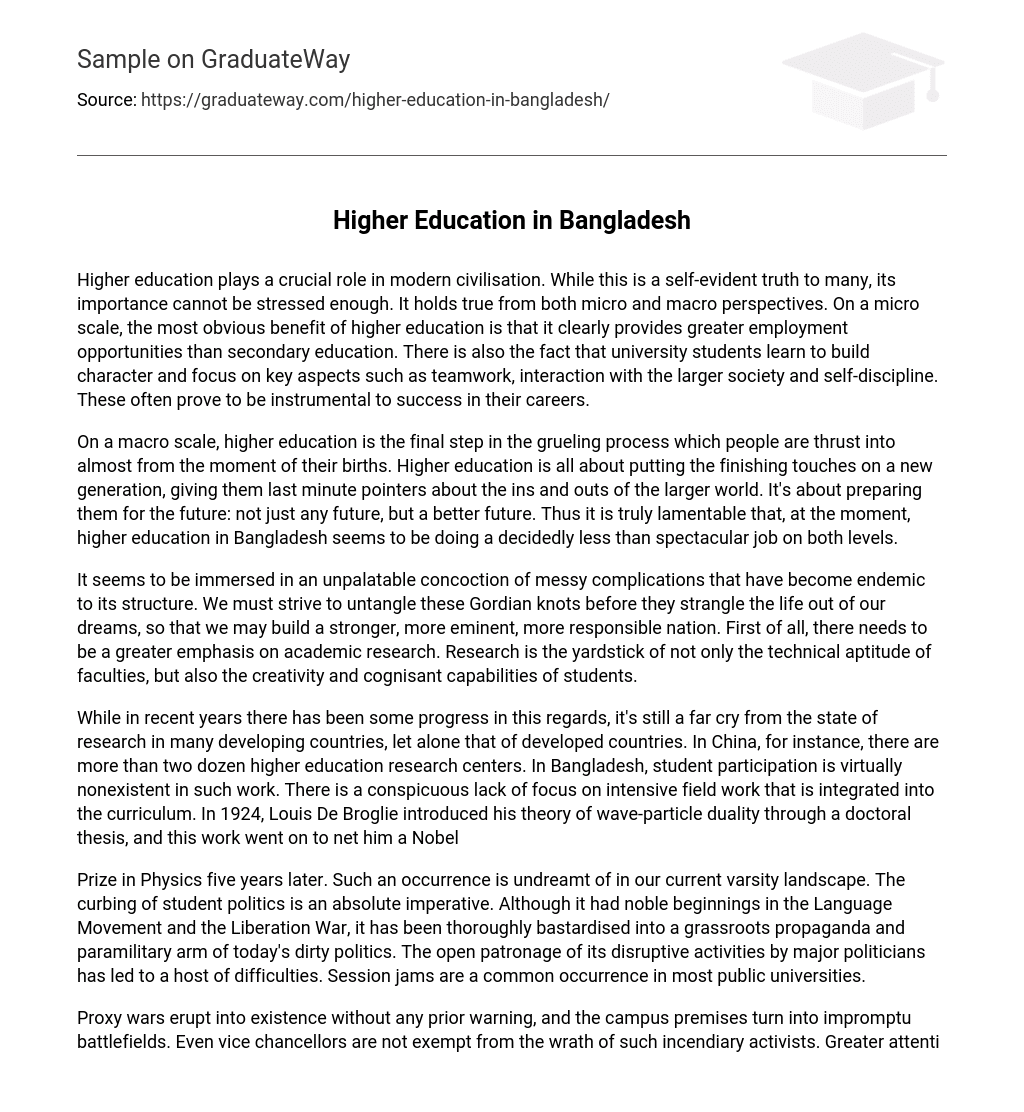Higher education plays a crucial role in modern civilisation. While this is a self-evident truth to many, its importance cannot be stressed enough. It holds true from both micro and macro perspectives. On a micro scale, the most obvious benefit of higher education is that it clearly provides greater employment opportunities than secondary education. There is also the fact that university students learn to build character and focus on key aspects such as teamwork, interaction with the larger society and self-discipline. These often prove to be instrumental to success in their careers.
On a macro scale, higher education is the final step in the grueling process which people are thrust into almost from the moment of their births. Higher education is all about putting the finishing touches on a new generation, giving them last minute pointers about the ins and outs of the larger world. It’s about preparing them for the future: not just any future, but a better future. Thus it is truly lamentable that, at the moment, higher education in Bangladesh seems to be doing a decidedly less than spectacular job on both levels.
It seems to be immersed in an unpalatable concoction of messy complications that have become endemic to its structure. We must strive to untangle these Gordian knots before they strangle the life out of our dreams, so that we may build a stronger, more eminent, more responsible nation. First of all, there needs to be a greater emphasis on academic research. Research is the yardstick of not only the technical aptitude of faculties, but also the creativity and cognisant capabilities of students.
While in recent years there has been some progress in this regards, it’s still a far cry from the state of research in many developing countries, let alone that of developed countries. In China, for instance, there are more than two dozen higher education research centers. In Bangladesh, student participation is virtually nonexistent in such work. There is a conspicuous lack of focus on intensive field work that is integrated into the curriculum. In 1924, Louis De Broglie introduced his theory of wave-particle duality through a doctoral thesis, and this work went on to net him a Nobel
Prize in Physics five years later. Such an occurrence is undreamt of in our current varsity landscape. The curbing of student politics is an absolute imperative. Although it had noble beginnings in the Language Movement and the Liberation War, it has been thoroughly bastardised into a grassroots propaganda and paramilitary arm of today’s dirty politics. The open patronage of its disruptive activities by major politicians has led to a host of difficulties. Session jams are a common occurrence in most public universities.
Proxy wars erupt into existence without any prior warning, and the campus premises turn into impromptu battlefields. Even vice chancellors are not exempt from the wrath of such incendiary activists. Greater attention should be paid to the state of private universities. In the last two decades, corporate colleges have mushroomed into being at an alarming rate. Such unplanned expansion has seriously jeopardised the quality of higher education. More often than not, a huge profit margin is the sole raison d’etre of a private university, and a commercial bias is prevalent in all aspects of its decision making.
While there are some exceptions, the majority of these new institutes are unremarkable at best and ineffectual at worst. Many of them lack proper campuses and are housed in substandard rented facilities. Most of them rely on part-time teachers from public universities. This prodigious growth must be regulated, with an eye for both quantity and quality. Tuition caps should be introduced, for surely higher education is not the exclusive domain of the affluent and the privileged. Some fundamental restructuring is required in many aspects of public universities.
Over the years, their budgets have grown so cumbersome that the majority of their funds are used up in paying the teachers’ salaries. Greater government funds would thus allow for more emphasis on research and other developmental works. We need to establish a mechanism that ensures greater accountability from faculties and administrations. We need to work out a system of checks and balances, which is dynamic rather than static, as the meaning and nature of excellence in education changes over time and varies over environments.
Teachers need to recommit themselves to education, as for some it has become just another job and only one of their many means to income. We must adopt effective, context-sensitive curriculum that is updated constantly upon feedback, which should include input from alumnae utilising their varsity educations in real world situations. The onus also falls on the students themselves to better prepare themselves for a proper varsity education. A lifetime of private coaching has numbed the initiative of many students.
They expect a certain amount of handholding, and many teachers in private universities are all too ready to oblige them. Needless to say, notes and short suggestions make for a poor knowledge base in the long term. At this stage, students are adults in every meaning of the word. No one else can do their hard work for them. Lastly, it should be noted that these are complex problems. They cannot be solved with haste, but rather careful deliberation, with consideration of all relevant data.
All the same, such corrective measures must not be stalled by bureaucratic inertia any longer than they already have been. We make much ado about retaining domestic talent and curbing brain drain, but why should we begrudge those who go abroad for higher education when the situation at home is decidedly less agreeable? We must not deny our futures any longer, for to do so is to insult our pasts and to make our presents meaningless. The time for hesitation is over. Forward is the only way to go.





